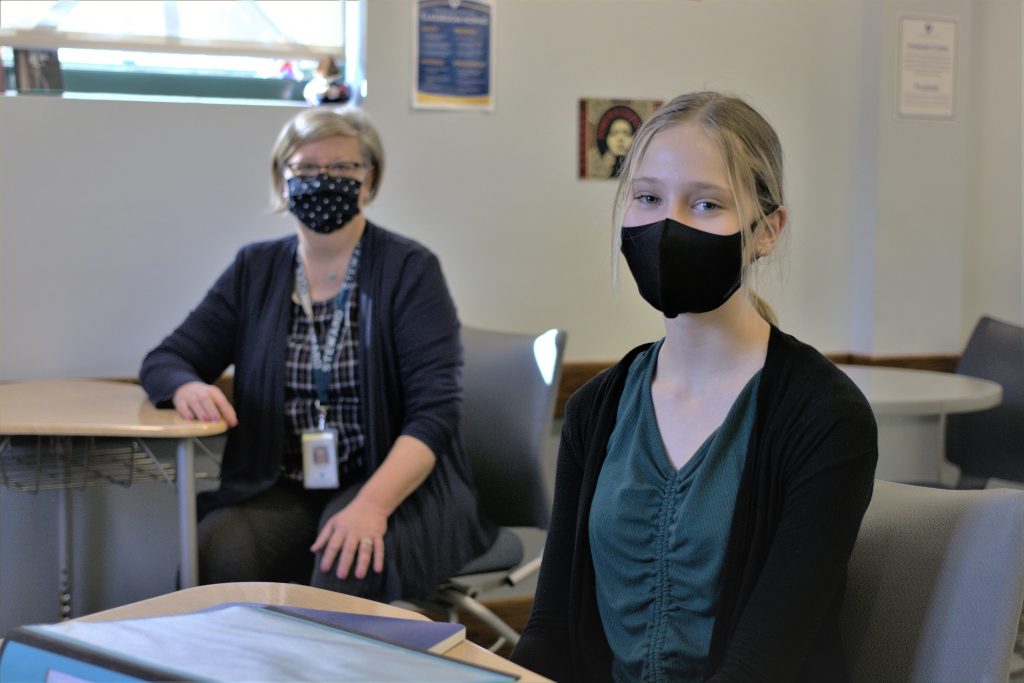At AMLE, we jump at the opportunity to amplify the middle school student’s voices and accomplishments. That’s why we were delighted to have the opportunity to speak with Gabrielle “Gabby” Marshall, a seventh-grade student at The Steward School in Richmond, Virginia and finalist in the Inaugural Poem Project and Contest for Students. Twelve-year-old Gabby placed third, behind two high school seniors including Amanda Gorman, whose reading of her poem invigorated the nation during last month’s inauguration. Gabby’s poem, “The Power of Hope Today,” rose above more than 800 submissions, and was compared by one contest judge to the work of Emily Dickenson.
We sat down with Gabby and her English teacher, Mary Hopkins, to learn more about her and her poem. But we came away with many more insights about the powerful impact that a positive school culture, caring educators, and – of course – poetry can have in promoting the growth and success of our middle school students.
The Power of Hope Today
As middle school educators know well, students are constant observers who develop as they engage with the world around them. In Gabby’s case, she couldn’t help but notice, “There’s so much hate and a lot going on right now. We need something uplifting.” English teacher Mary Hopkins saw an opportunity to channel Gabby’s optimism and love of poetry when she heard about the contest. Gabby jumped at the chance, “I really wanted to put myself out there. I wasn’t expecting anything.” What resulted was an incredibly insightful work that weaves together themes of unity, self-reflection, and the power of human connection.
From The Power of Hope Today:
Today’s hope is the sparkling eyes that
truly believe in achieving
anything to reach unity.
Today’s hope is the palm to palm connection
bracing each other for the climb neither expected,
but couldn’t abandon.
Today’s hope is peering
beyond
the lingering barrier,
but still recognizing the diversity in ourselves.
Poetry as a Bridge from Concrete to Abstract
While Gabby has been writing poetry since the 4th grade, she acknowledges what an influence Mrs. Hopkins has had on her work. Her content suggestions have helped, to be sure, but even more important has been her constant encouragement and the creative license to explore and experiment. “She’s helped me all along the way of this journey I’ve been on.”
That’s no coincidence, as veteran English teacher Mary knows how useful poetry can be in her curriculum. “The beauty of teaching in 7th grade is it’s that moment when their brains are going from concrete to the abstract – and poetry really ignites that fire.” She started by occasionally teaching the daily poem from The Academy of American Poets and, at first, the students weren’t that into it. “But now, it’s like a lightbulb goes off and they’re comparing poems we’ve studied without being prompted. It’s just experience; they don’t have a lot of experience with poetry.”
The Power of School Culture
Both Gabby and Mary emphasized the importance of experimenting, trying new things, and taking risks in the success of her poetry. And Mary was quick to acknowledge that this culture of exploration starts at the top. “Our head of middle school, Susan Atkinson, is amazingly supportive. When we want to try new things, she finds a way to make it happen…Nobody can try anything if they don’t feel supported. It’s important to model that risk taking for students and let them know things don’t always go right. Middle school students won’t try unless they feel supported, and they feel safe.”
That support includes celebrating both the big and small moments for students and staff. Gabby exuded a bright smile when she recounted how excited both Mary and Susan were when she shared the news that she had placed in the contest: “I think Mrs. Hopkins was as excited as my mom!”
The Importance of the Middle School Student Voice
You don’t have to enter a poetry contest to enjoy the benefits of writing poetry, Gabby contents. And she encourages all students to pick up a pen and just start writing. “It’s a great way to express yourself, even if it’s not the best poem. Just try it, you never know!”
When asked what advice she might give to other middle school students, Gabby said that students can, “spread positivity. It doesn’t have to be much because little things matter. We can change the world!”
After her many years in education, Mary also recognizes the importance of this time of development during the middle school years, “Their brains are changing so much. They are recognizing their own power, and if we don’t encourage that it may not be as strong as they go through the rest of their education…It’s that moment when they’re realizing I have something to say we need to amplify that.”
As for Gabby’s future, she’s not yet sure what she wants to do but plans to continue writing. “I might want to write some crazy novel like Harry Potter.” We certainly can’t wait to see where her future leads!
Do you have a student story, or impactful teacher-student relationship, you think AMLE should highlight? Please let us know by emailing ssimpson@amle.org!
